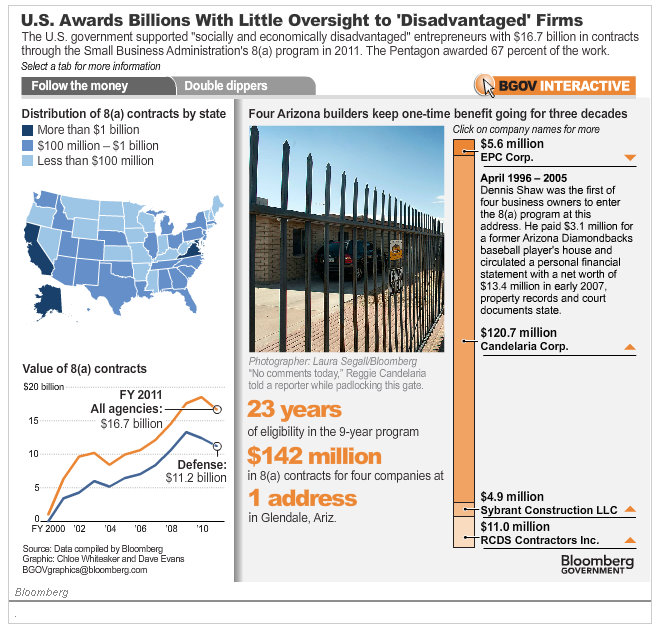

Get Connected
Subscribe to our e-newsetter and get the latest information delivered straight to your inbox.
Articles
Lawmakers Demand Crackdown on U.S. Program Enriching Wealthy
Washington,
February 22, 2012
Tags:
Contracting
In the House of Representatives, which hasn’t taken up the measure, Missouri Republican Sam Graves, chairman of the Small Business Committee, said the Justice Department “is reluctant to use its resources to pursue small business fraud cases if the cost of prosecution will outweigh the costs of recovery.” The Graves panel is considering a bill that would address fraud in government procurement, said D.J. Jordan, a spokesman for the committee, in an e-mail. The proposal by Representative Mick Mulvaney, a South Carolina Republican, “will make it easier to crack down on deceptive large businesses hiding behind small businesses,” Jordan said. ‘Worst Examples’ Snowe’s bill, known as the Small Business Contracting Fraud Prevention Act of 2011, would force the SBA to improve certification, surveillance and enforcement, she said. The measure passed the Senate with unanimous consent and has 13 co- sponsors. Since 1990, the SBA has certified multiple companies at a single address more than 100 times, based on data compiled by Bloomberg. Twelve repeat participants have received $412 million in preferential contracts and more than $1 billion in total government awards, Bloomberg found. Under the rules, a qualifying small business should participate only once in the preference program, which should last just nine years. “Tomorrow, the inspector general should look into not just terminating the contracts of the worst examples, but checking out the more than 100 times the SBA certified multiple companies at a single address,” said Charles Tiefer, who served on the U.S. Commission on Wartime Contracting. Growing Rich Officials should consider “a potential referral to the Justice Department for civil clawback proceedings,” said Tiefer, who is now a professor at the University of Baltimore Law School. A Florida family grew rich on $256 million in federal contracts since 1993, in part through a web of closely held companies that allowed members to remain 18 years in the nine- year program for the disadvantaged, Bloomberg reported. Brothers Akhil Agrawal, 44, and Sukrit Agrawal, 46, participated in the SBA program from 1994 to 2003 and continue to win preferential contracts today through a joint venture with their father’s firm, APS Technologies Inc. The family denied any wrongdoing in a written statement. “The story of how the Agrawals got rich by manipulating the system is a textbook example of why vigorous government oversight is needed before taxpayer dollars are handed over,” said Nick Schwellenbach, director of investigations at the non- profit Project on Government Oversight in Washington. More Oversight Urged The SBA defines the socially disadvantaged as “those who have been subjected to racial or ethnic prejudice or cultural bias,” such as women, blacks, Hispanics, Native Americans and Asian-Americans. Eligibility in the Section 8(a) program is limited to U.S. citizens whose net worth can’t initially exceed $250,000 and shouldn’t rise above $750,000 while in the program. “If, in fact, the process can be circumvented to the extent that it appears that it has been, that would suggest to me that there needs to be a lot more oversight and perhaps rules need to be changed in order to ensure compliance,” said Rob Burton, a top U.S. procurement official under President George W. Bush. He is now a partner in the Washington office of the Venable LLP law firm. Admission to the program for the disadvantaged gives entrepreneurs a passport to obtain federal contracts that typically aren’t subject to competition. The U.S. targets 23 percent of its $530 billion in buying each year for small companies through an array of assistance, of which the 8(a) designation is only one. Business owners and members of their immediate families may participate only once, though the SBA spells out exceptions. These include approved mentoring relationships and joint ventures between past and current participants, or if participants are in different lines of business. |
